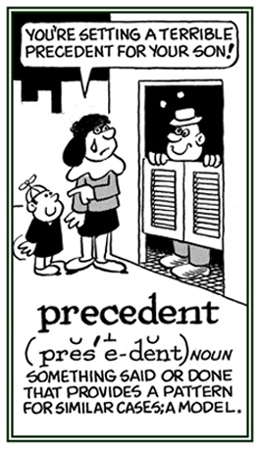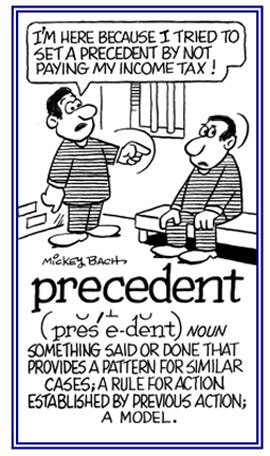You searched for:
“precedent”
1. A previous act or instance that may be used as an example in dealing with subsequent similar instances: In law, a judicial decision that may be used as a precedent in comparable cases that take place at a later time.
2. An example that is used to justify similar occurrences at a later time: Margaret set a precedent by being the first woman executive in her company.
5. Etymology: "to go before" in rank or importance, from Modern French preceder, from Latin præcedere, "to go before" from præ-, "before" + cedere, "to go".

© ALL rights are reserved.

© ALL rights are reserved.
Go to this Word A Day Revisited Index
2. An example that is used to justify similar occurrences at a later time: Margaret set a precedent by being the first woman executive in her company.
5. Etymology: "to go before" in rank or importance, from Modern French preceder, from Latin præcedere, "to go before" from præ-, "before" + cedere, "to go".


Go to this Word A Day Revisited Index
so you can see more of Mickey Bach's cartoons.
This entry is located in the following units:
-cede, -ceed, -cess, -cease
(page 4)
pre-, prae-
(page 3)
precedent, president
precedent (PRES i duhnt) (noun)
1. The occurrence of something that sets an example for others: He set a precedent for his employees by coming to work an hour early every day.
2. A custom or an activity that has become established over time: Having a meal break at midday seemed to be the precedent at Jack's new job.
2. A custom or an activity that has become established over time: Having a meal break at midday seemed to be the precedent at Jack's new job.
president (PREZ i duhnt, PREZ i dent") (noun)
1. An individual who has been chosen to serve as the chief of state in a government: She was the first female president elected to the office in 75 years.
2. A person who is the chief official or officer in a business or corporation: The Board of Directors at the company elected Linda's uncle as President of the Board for a two-year term.
3. Somebody who is chosen to lead or officiate over a meeting: The president of the parents' organization called the assemblage to order.
2. A person who is the chief official or officer in a business or corporation: The Board of Directors at the company elected Linda's uncle as President of the Board for a two-year term.
3. Somebody who is chosen to lead or officiate over a meeting: The president of the parents' organization called the assemblage to order.
The president of the company set a new precedent by inviting all of the employees for refreshments in her office on her first day on the job.
This entry is located in the following unit:
Confusing Words Clarified: Group P; Homonyms, Homophones, Homographs, Synonyms, Polysemes, etc. +
(page 7)
